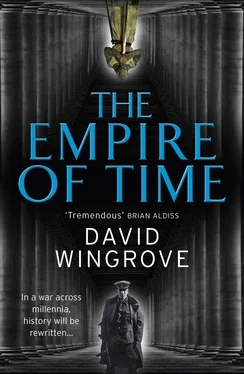David Wingrove - The Empire of Time
Здесь есть возможность читать онлайн «David Wingrove - The Empire of Time» весь текст электронной книги совершенно бесплатно (целиком полную версию без сокращений). В некоторых случаях можно слушать аудио, скачать через торрент в формате fb2 и присутствует краткое содержание. Жанр: Альтернативная история, Фантастика и фэнтези, на английском языке. Описание произведения, (предисловие) а так же отзывы посетителей доступны на портале библиотеки ЛибКат.
- Название:The Empire of Time
- Автор:
- Жанр:
- Год:неизвестен
- ISBN:нет данных
- Рейтинг книги:5 / 5. Голосов: 1
-
Избранное:Добавить в избранное
- Отзывы:
-
Ваша оценка:
- 100
- 1
- 2
- 3
- 4
- 5
The Empire of Time: краткое содержание, описание и аннотация
Предлагаем к чтению аннотацию, описание, краткое содержание или предисловие (зависит от того, что написал сам автор книги «The Empire of Time»). Если вы не нашли необходимую информацию о книге — напишите в комментариях, мы постараемся отыскать её.
The Empire of Time — читать онлайн бесплатно полную книгу (весь текст) целиком
Ниже представлен текст книги, разбитый по страницам. Система сохранения места последней прочитанной страницы, позволяет с удобством читать онлайн бесплатно книгу «The Empire of Time», без необходимости каждый раз заново искать на чём Вы остановились. Поставьте закладку, и сможете в любой момент перейти на страницу, на которой закончили чтение.
Интервал:
Закладка:
Neighbours come running, asking if we’re okay. Both children are crying, and Gehlen’s wife just sits there, badly shaken. An alarm is going off somewhere now, its repetitive drone shredding the nerves, but no one’s hurt .
I let out a long, sighing breath, then look down at the object I’m holding and shake my head. It’s a child’s toy. A small, yellow giraffe, twelve inches long and made of soft rubber.
Gehlen comes across and takes it from me, staring at it in wonder. ‘George,’ he says. Then, looking up into my face, he asks: ‘How did you …?’
Loops , I want to say, but I just shrug.
Only he’s too intelligent not to make connections. Too clever not to unpick this conundrum stitch by stitch and put it back together. Oh, and I know what you’re thinking: that Hecht could simply have sent him the equations, only that isn’t how it works. Not for something as essential as this. This once the ‘fallacy of inaction theory’ doesn’t apply. We know, because we’ve tried.
But maybe this is enough. After all, Gehlen has been working on Q-balls for some time now — trying to fit them into the general picture — and though thus far he’s failed, maybe this will give him the jolt that will allow him to think the unthinkable.
A toy giraffe named George …
I stare at it in his hands and laugh, and he looks up at me.
‘Hetty,’ he says, speaking to his wife, his eyes never leaving me. ‘Leave that now. Just take the children and go to the safe haven. I’ll join you later. There’s something I have to do.’
136
It is happening, even as we’re in the air. It is ten past two and the Russians, reeling under the first massive, five-pronged assault, have withdrawn their forces to a line that runs from Riga in the north to Odessa in the south. They are regrouping, ready to push the Germans back after this latest feint in the Great Game. Only they’re mistaken, for the rules of the game have changed.
They have yet to realise that, this time, Manfred is in earnest.
Vast fists of heavy cloud dominate the sky outside, their sculpted shapes so dark and bruised they’re almost purple, yet between them I can see great swathes of sunlit meadow. Indeed, the whole landscape has a brooding, unnatural look to it. The great world of field and wood and stream looks super-real in these, its final moments.
Soon — not long now — the first of the bombs will fall.
I look across at Gehlen. His face looks strange, mask-like, in the golden light from the portal just beyond him. I study him a moment, as one might study any natural phenomenon.
Gehlen is lightning. Gehlen is pure electricity, fallen to the Earth. He is a sun, throwing out energy and ideas — enough for a hundred thousand lesser men. And yet he is also a man, flawed and mortal.
Conscious of my attention, he turns to me.
‘I don’t know why you need to know any of this, but you get one shot, okay?’
‘Okay.’
I have been mulling things over on the way down. Wondering why, for instance, there were no guards on Gehlen’s apartment, and why, other than his importance to Manfred, they should want to bomb him, and whether it was Russian agents who did it. Time agents, that is.
Only time agents would have monitored the results and jumped back in again just as soon as they saw they’d failed. And then … but that gets complicated, so it can’t have been that.
Reichenau?
More than anything, I want to know what Reichenau’s part in this is, because if anyone’s setting off these bombs — and from the news reports we’ve heard, there’s been a whole spate of them — it’s Reichenau’s Unbeachtat , his revolutionaries.
But why should Reichenau put me in a position where I could save Gehlen, if it was he who planted the bomb in the first place? Or is there something glaringly simple that I’ve overlooked?
I look to Gehlen once again. ‘Why are you doing this?’
‘Because I owe you a life.’
I gesture towards the cameras. ‘You aren’t afraid of …?’
‘Of being watched? I don’t think anyone’s being watched right now. It’s chaos out there. But if you must know, I’ve permission to show you round.’
‘Permission?’ That surprises me more than anything he’s said. ‘From whom?’
‘From Tief. He has instructed me to show you whatever you need to see.’
And he hands me a sealed document, from Tief’s office, granting me access to the facility at Orhdruf.
Which makes no sense at all.
Or rather, it makes me want to jump back, right there and then, and present it all to Hecht; to let his cool reason play over everything I’ve seen and heard like a searchlight, making sense of it all.
‘I see,’ I say, although I don’t. ‘I see.’
137
Rain is falling, spotting the soft, pale stone of the battlements as we step down from the ship. Orhdruf, I note with some surprise, is another castle; a fact I completely overlooked last time, distracted possibly by Manfred’s cruisers, waiting to arrest me.
Gehlen takes Tief’s pass from me and, waving it overhead for the security cameras, walks across the pad and through the gate, leaving me to hurry after.
We make our way down several dark twists of steps and along dank, dimly lit corridors until, at the bottom of one last twist of steps, we come out into the most curious of laboratories.
It was a chapel once, I’m sure. Two long lines of slender stone pillars form walks to left and right. Between them are several huge work-benches, piled high with electrical equipment. Two assistants — one young, one surprisingly ancient — look up as Gehlen approaches, surprise registering on their faces as they see me there.
‘This is Otto,’ Gehlen says, looking about him for something. ‘He’s come to see how we do things here.’
It’s a strange thing to say, and almost humorous, only the two assistants don’t laugh. They simply stare at me suspiciously.
I look about me, surprised by how chaotic everything appears. It looks more like a dump than a workplace . Notebooks lie open everywhere you look, their pages filled with strange diagrams and scrawled figures, many of which are crossed through. It makes me think — not for the first time — that Hecht ought to have sent someone with a better scientific grasp. Then again …
‘Okay,’ Gehlen says, pocketing a small, round object. ‘You want to see? Then let’s see. We’ll take the lift down to the seventh level.’
138
We step into the room and there it is, spinning slowly in the darkness, so dark it almost seems bright. You can’t actually see it, of course, but then again you can’t fail not to see it. The brain registers it somehow as an absence.
We are wearing protective clothes, and dark visors, and I wonder how we can stand only a metre or so away from a black hole and not be sucked in … only we can. It might seem like magic, but as Gehlen himself has said: ‘It’s not magic, it’s physics. If the maths works, it works.’
I don’t claim to even begin to understand this; the equations are so far beyond my comprehension that my mind simply rejects them. It was hard enough memorising them to do my party trick. Only they work. And because they do, Gehlen has been able to create a ‘field’ in this room that contains the singularity.
‘Where is it?’ I ask, expecting some visual sign of the fluctuation, of the ‘drainage’ which, I know, is linked directly to Ernst back across the centuries.
‘It’s inside,’ Gehlen says. ‘Just within what we call the Cauchy Horizon.’
I haven’t a clue what he’s talking about, but I’m disappointed that I can’t see anything I can ‘switch off’ to end Ernst’s misery.
Читать дальшеИнтервал:
Закладка:
Похожие книги на «The Empire of Time»
Представляем Вашему вниманию похожие книги на «The Empire of Time» списком для выбора. Мы отобрали схожую по названию и смыслу литературу в надежде предоставить читателям больше вариантов отыскать новые, интересные, ещё непрочитанные произведения.
Обсуждение, отзывы о книге «The Empire of Time» и просто собственные мнения читателей. Оставьте ваши комментарии, напишите, что Вы думаете о произведении, его смысле или главных героях. Укажите что конкретно понравилось, а что нет, и почему Вы так считаете.












